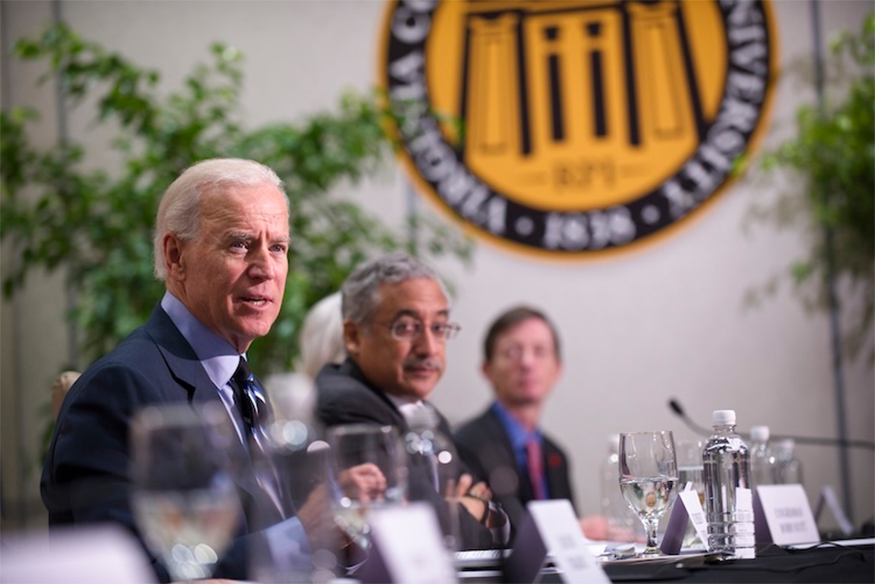Latest News
Research & Innovation, Prevention
How common is prostate cancer: Massey oncologist breaks down symptoms and at what age you should start getting screened
May 21, 2025
 Then-Vice President Joe Biden hosted a roundtable discussion on gun safety at Virginia Commonwealth University in 2013. (Allen Jones, Enterprise Marketing and Communications)
Then-Vice President Joe Biden hosted a roundtable discussion on gun safety at Virginia Commonwealth University in 2013. (Allen Jones, Enterprise Marketing and Communications)
After spending years advocating for research to stop cancer in its tracks, former President Joe Biden now faces his own uphill battle with the disease.
In mid-May, Biden shared he was diagnosed with an aggressive form of prostate cancer that spread to his bones. It was discovered after the 82-year-old was experiencing urinary symptoms and a nodule was found on his prostate.
“While this is very unfortunate, the diagnosis wasn’t uncommon”, says Asit Paul, M.D., Ph.D., medical oncologist and member of the
 Developmental Therapeutics research program at VCU Massey Comprehensive Cancer Center. That's because prostate cancer is the most common cancer diagnosed in American men and is the second most common for men worldwide. According to the American Cancer Society, about 60% of all prostate cancers are diagnosed in men 65 and older.
Developmental Therapeutics research program at VCU Massey Comprehensive Cancer Center. That's because prostate cancer is the most common cancer diagnosed in American men and is the second most common for men worldwide. According to the American Cancer Society, about 60% of all prostate cancers are diagnosed in men 65 and older.
“About 75% of patients are diagnosed in the early stages, which could be curable with radiation or prostate removal,” said Paul, who is the co-leader of Massey’s Urologic Oncology Disease Working Group and a professor at Virginia Commonwealth University’s School of Medicine. “However, based on the report, the president’s cancer was diagnosed in an advanced stage. This stage is considered incurable, but it could be controlled. Recent advances in treatment have improved the outcome significantly.”
Paul spoke with us about the importance of cancer screenings and the treatment options available at Massey.
Being diagnosed with cancer can be very scary. What is the first thing you share with patients and their families when they receive this news?
While diagnosis of cancer is very stressful, the good news is that advancements in cancer research and new ways to treat cancer have been improving the outcome for many patients. Early diagnosis and seeking medical care early are the key for a better outcome.
What are the signs and symptoms of prostate cancer?
Most prostate cancer patients, particularly in the early stage, have no symptoms. Some patients may have urinary symptoms, such as increased frequency, urgency, hesitancy and difficulty urinating.
Bone pain may be the presenting symptom for some patients whose cancer spreads to bone. Other symptoms, such as weight loss, profound fatigue and back pain, may indicate advanced cancer.
Are there any symptoms that patients might overlook?
Since many urinary symptoms overlap with symptoms related to noncancerous enlargement of prostate, it could be missed.
How do you screen for prostate cancer? Does it hurt?
Prostate specific antigen (PSA) testing is available in all VCU Health primary care physician’s office. It is a simple blood draw.
When should someone get screened for prostate cancer?
Screening of prostate cancer should be a shared decision between a patient and a health care provider.
The American Cancer Society recommends PSA testing should start at age 50 for most men. Testing starts earlier for men at higher risk, particularly those with a first-degree relative (father or brother) diagnosed with prostate cancer at a younger age (under 65). Screening starts at 45 years old for men with one relative with a diagnosis, and 40 for those with multiple relatives.
Are there any populations that have a higher risk for developing prostate cancer?
Yes, there are several groups more at risk of developing prostate cancer.
- The most common risk factor is age. The older you are, the greater your chance is of a diagnosis.
- Those with a family history of prostate cancer may have an increased likelihood of developing it because of inherited genetic traits.
- Black men are 70% more likely to develop prostate cancer compared to other races. It is likely due to a combination of genetic predisposition, lifestyle factors and health care access.
What does treatment look like for patients at Massey Comprehensive Cancer Center?
Treatment depends on the stage at diagnosis. Many patients with low-risk, localized cancer may not require immediate treatment and may qualify for active surveillance. Surgical removal of prostate or radiation are options for most localized prostate cancer.
Hormone therapy is the backbone of treatment for advanced prostate cancer. This is combined with novel antiandrogens, chemotherapy and targeted treatment as appropriate.
At Massey Comprehensive Cancer Center, prostate cancer management is provided through an integrated, multidisciplinary approach that includes expertise from urology, radiation oncology, medical oncology, radiology, nuclear medicine, genetics and pathology. The team meets regularly to decide on the best care plan for each individual patient.
There are a wide variety of state-of-the-art treatments available for our patients, including multiparametric MRI-based diagnosis, fusion biopsy, ultrasound based focal therapy, targeted radiotherapy, robotic prostatectomy and PSMA-based targeted therapy. Massey also provides patients the option of participating in clinical trials to gain first access to the latest, cutting-edge treatment options.
What other support systems are available at Massey for prostate cancer patients?
At Massey, we don’t just focus only on the treatment of cancer. There is also a network of support available for patients and their caregivers.
Massey’s Integrative Health program provides additional services to support health and wellness of patients, including nutritional advice and smoking cessation resources. Prostate cancer patients can also join a men’s support group to connect with fellow patients and providers. We also have a supportive care clinic focused on helping to manage cancer-related symptoms and a survivorship clinic for cancer survivors.
If you would like to support Massey’s prostate cancer research, you can make a gift to the Prostate Cancer Research Fund or the Ted Santarella Fund for Prostate Cancer Research.
This was repurposed from an article originally published by VCU Health.
Written by: Sara McCloskey
Related News
Clinical Care, Prevention
VCU Massey now offers new technology for early detection of lymphedemaDec 8, 2025
Research & Innovation
Robert A. Winn Excellence in Clinical Trials Program Annual Convening highlights long-term, dynamic public-private partnershipNov 24, 2025

Get access to new, innovative care
Treatments in clinical trials may be more effective or have fewer side effects than the treatments that are currently available. With more than 200 studies for multiple types of cancers and cancer prevention, Massey supports a wide array of clinical trials.

Find a provider
Massey supports hundreds of top cancer specialists serving the needs of our patients. Massey’s medical team provides a wealth of expertise in cancer diagnosis, treatment, prevention and symptom management.
